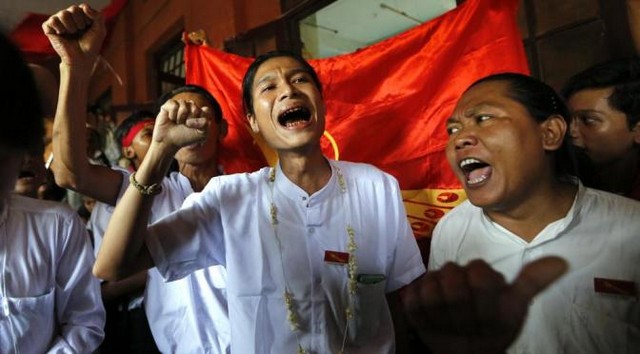By M Zarni
To be Burmese is to be Buddhist: Myanmar Generals’ Winning Ideology
To build peace and reconciliation within society, Myanmar must destroy the view/sentiment that to be Burmese is to be Buddhist.
It is one big narrow-minded, religious obsession which has nothing whatsoever to do with Buddhism.
It is tinged with the old culturalist nationalism hoisted as the initial flag of resistance against the predominantly Christian British colonial rule. It is an anathema to the multi-faith founders of post-colonial Union of Burma, particularly the late U Aung San, the martyred father of the “Buddhist” leader of the NLD.
It makes non-Buddhists, whatever their ethnic ancestry, feel they are not fully equal or welcome or entitled to citizenship privileges, rights and protection.
This narrow view of Burmese identity amounts to religious bigotry. Bigotry serves the interests of the bigots – Buddhist monks, who operate within a closed system of thought, because of their devotional embrace of Buddhism as the only or superior Faith.
For their own strategic ends, the Burmese generals perniciously exploit this orthodox ideological community – nearly half-million men, usually drawn from rural, conservative backgrounds, not unlike the rank and file of the Burmese Armed Forces.
When Ne Win came to power in 1962, his regime of Burma Socialist Programme Party identified two above-ground social forces as major threats to the military and its attempts to shape society along its socialistic authoritarian lines. They were the Buddhist monks and university students.
Now the military has found a winning strategy: use the popular religious bigotry commonly shared among key national institutions – the Order, the armed forces and the society – to turn old enemies of monks and public into the tools of their own oppression.
It is an absolute necessity for those of who want to see a secularist country where people of different faiths and diverse ethnic ancestries can feel they are all equal, both in theory and in society to demolish this bigoted definition of the people of Burma.
National identities in a religiously diverse society must not be tied to any faith, deistic or atheistic, if the goal of the government and political parties are to forge an inclusive country.
Alas, that is not what is being pursued by neither Myanmar military, which thrives on exploiting ethnic and religious divisions in society, nor Aung San Suu Kyi and her NLD, which attempt to placate, rather than educate and confront, the bigoted vocal minority.
10 January 2017

